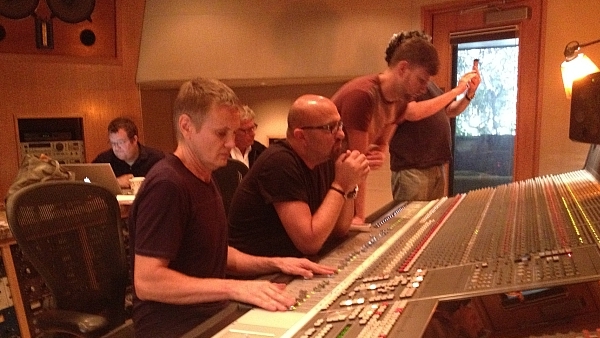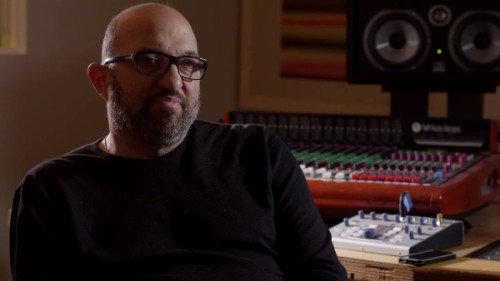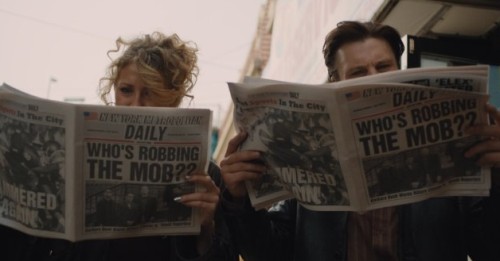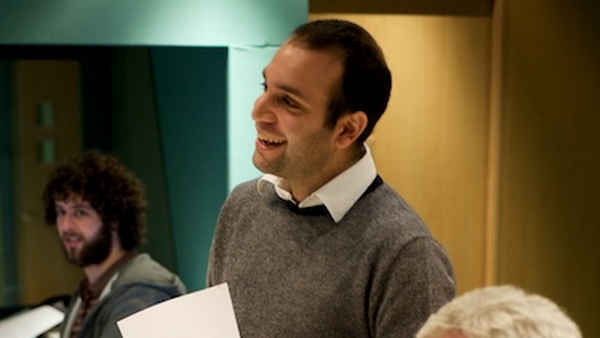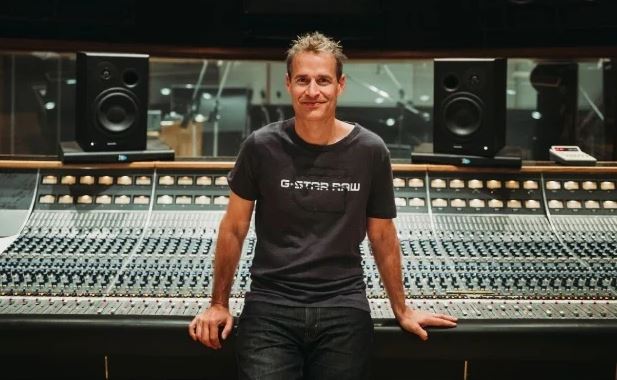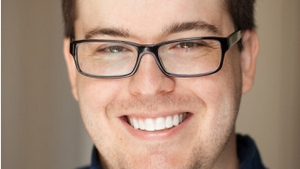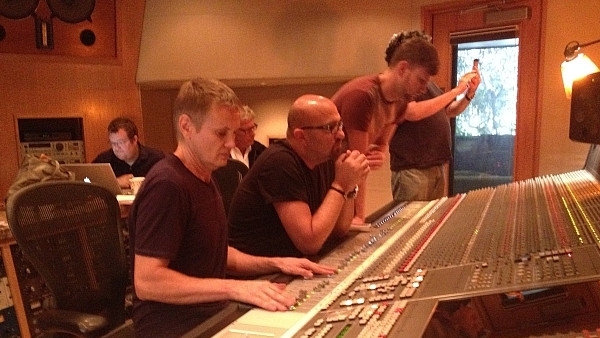 Raymond De Felitta’s latest film Rob the Mob is based on the true story of the New York couple who would pulled off Mafia heists during the Gotti trial in the early 1990s. It stars Michael Pitt, Nina Arianda, Andy Garcia and Ray Romano and this period film finds composer Stephen Endelman re-teaming with the Oscar-nominated filmmaker. Last week we were fortunate to speak with this seasoned musician to discuss his work on the film.
Raymond De Felitta’s latest film Rob the Mob is based on the true story of the New York couple who would pulled off Mafia heists during the Gotti trial in the early 1990s. It stars Michael Pitt, Nina Arianda, Andy Garcia and Ray Romano and this period film finds composer Stephen Endelman re-teaming with the Oscar-nominated filmmaker. Last week we were fortunate to speak with this seasoned musician to discuss his work on the film.
Endelman, who was actually living in NY during the original heist incidents, crafts a wonderfully simple musical backdrop to the love story of this modern day Bonnie & Clyde as well as the grittiness of their criminal acts. Originally from Northern London, Stephen now lives in LA and works in his studio on Melrose – right across the street from Paramount Pictures. Before making the jump to the West coast Stephen lived in New York and he’s a composer who, like the very best of his profession, gets to the heart of the story without manipulating the audience. His score for Rob the Mob is as simple as its real life characters.
If you were to ask Stephen about his heroes he’ll easily run down an impressive and varied list of musicians which doesn’t necessarily include film composers. He is entirely fond of the likes of Beethoven, Gustav Mahler, Schaumburg, Stravinsky and Pierre Boulez. Though he does have his favorites among film composers (ranging from Elmer Bernstein and Ennio Morricone to John Williams, James Newton Howard and Thomas Newman) Stephen doesn’t think film composers should solely to the works of film composers. He enjoys classical composers but is also fond of contemporary music like what The Chemical Brothers did for Joe Wright’s Hanna. Like Stephen says, “I’ll listen to anything as long as it’s good“.
Stephen believes the function of film music is to simply support the drama. If you’re watching the film and you’re thinking about the music, aside from a technical sense and if it’s your job, then you’re not docusing on the story. Sometimes, as an artist, you have to be a fan of everything to really be good at what you do. Based on the inspiration he draws from and his years in the business, Stephen is great at what he does. Enjoy the rest of the highlights from our time with Stephen Endelman.
GST: I know it’s a generic question but I always find it fascinating to learn how a composer got on board. So tell us, how did you come to score Rob the Mob?
SE: It’s pretty straightforward. I worked with Raymond about 10 years ago on a movie called Two Family House and
he and I bonded in that musical experience. I was unavailable when he did City Island, but when he started working on Rob the Mob he asked if I wanted to be part of it. And really he didn’t even ask. He just said “Stephen you’re doing Rob the Mob”. So I read the script that night and then said “Yes! I’m doing Rob the Mob!”
Then he came to the studio one afternoon and over drinks he said “okay, look this is what we should do. I’m going to start shooting and I’m going to tell the producers that for the first six weeks of editing I want to be in one of your rooms here. I’ll cut in one room, and you’ll be right in another one and we’ll just exchange ideas as we go”.
And that’s exactly what we did and it was one of the most brilliant and creative and musically fulfilling experiences that a film composer could ever wish for. To be so close to the director and editor, a mere paces away, and them being able to say “I need a musical cue here”, then I would write it, and he would put it in the film and we just kept working like that. It was a thoroughly enjoyable experience.
GST: Sometimes you hear horror stories of composers who come in at the 11th hour, or some other undesirable work condition, but that sounds as optimal as it could be working in tandem like that.
SE: Yes, that was a very desirable position to be in. When the producers came to NY after five weeks, to see literally the first assemblage of the film, I had written the entire score and they just couldn’t believe it. At that point it was just a matter of taking what was a two and a half hour movie down to one hour and forty minutes. But the score was ostensibly done by then because I had started as soon as Raymond had sent me footage from the set, and in my mind, having read the script, I knew what we were going to do. Then it was just a matter of putting it down on paper.
GST: I’ve heard that reading the script might bog you down with minutia as opposed to scoring from a treatment or footage. But do you make it a point to read the script for every project you take?
SE: That’s a good question. Sometimes no because I’ll just get the movie, or the show, but generally I like to read the script because I get a really good idea from the script what they would like, what they would need, or what I think is right for it. The beauty of this particular process, and I’ve done it on a couple of other movies, is that working on it from the very beginning means there is no temp score. It’s all my music from day one and that’s really what Raymond wanted. He didn’t want to end up temping the film, and either falling in love with the temporary score and having me replace it, or me never being able to get my say in the film.
That’s what happens to a lot of people. Now I feel, and have felt this way for a while, that the art of film scoring and moreover continuity has been lost because of temp music. When you go after specific moments or beats in the story you lose focus on the overarching theme or point of the story. That’s why a lot of films today have very little continuity. Some do, but a lot of them don’t. This is a very traditional scoring process for me. With Rob the Mob I found my themes and I developed them accordingly.
Max Steiner, Erich Korngold, Alfred Newman, they were some of the best because they worked on the theme and variations principle – here’s your themes for your characters, now you have to learn how to vary them and adapt them across the film. How do you take one thing and make it something else? How do you make something sad, happy, whatever? How do you make a jazz theme sound like an orchestral theme and not one score that has 30 pieces of music that seem like they could have been written by 30 different people?
But everybody, the director, the producers, needs to hear the music as they are cutting and they add the temp music themselves. Then they get a composer to redo the temp or come up with his own ideas and quite honestly, I’d rather just watch the movie absolutely bare, or read the script where there is no music, and just say look, I think this is what it should sound like. At that point they are either on board or they’re not on board. Now Raymond is such a excellent musician himself and he’s so eloquent when he speaks about music. He and I have a really good synergy together and it works well.
GST: You say you didn’t get to work on City Island, but it’s one of Raymond’s best and I just adore that movie. Being from New York, whenever I watch that it, I feel like I’m home.
SE: For me, I feel the same way watching Two Family House as well as a few other movies I’ve been lucky enough to be involved with, like A Bronx Tale, that just put me right back there. But this movie did that for sure. Actually 1992 found me fresh off a plane from London. I’d been in NY six months before this whole thing happened. Personally I have always have been fascinated by the mob, and I was actually reading about this in The Post, and now 20 some years later I get to write about it, musically speaking. For me it’s a bit surreal looking back and then being closer to the events. So you grew up in NY then?
GST: I grew up in Newburgh which is about an hour outside the city. But I never heard about Tommy and Rosie and I thought ‘what was I doing that I didn’t know about it?’. Granted I was in 6th grade *laughs* but since you were in New York at that time, can you go back 20 odd years and recall if was this a big deal? I mean these two helped bring down the mob so what was the resounding effect of their actions?
SE: Oh I know Newburgh very well, I lived in the West Point area for two years. Lovely area but not for me, I’m a city boy. But no it wasn’t a big deal. It was barely a byline in The Post. And it wasn’t a big deal at all. We were all watching Tommy “The Bull” Gravano on trial and being fascinated by it and wondering if the “Teflon Don” was going to get off again.
GST: Well Tommy and Rosie had such a big role, unlikely as it was, in the downfall of organized crime, but they were nobodies. So as “normal people” how did you approach their themes, specifically Tommy’s which is the main theme in the film? How much philosophy goes into a score, or is it simply reacting to picture or, in your case, the script?
SE: I think a lot about the characters I’m writing, I really do. The thing I love about this movie particularly, more than
many others, is that I fell in love with Rosie and Tommy. I know they are flawed, but everyone has flaws. Every character in this movie is flawed. No one’s perfect right? So I fell in love with this kind of innocence.
They are so in love with one another they would practically jump off buildings for each other. They are completely in love in that very innocent way and I wanted to capture that somehow in the music. But at the same time what they’re doing is really dangerous and really silly. One can only wonder what point, if at all, did they know that what they were doing is ultimately going to end in them dying?
Once they get “the list” they probably think they’re safe for a little while. They actually call and tell the bad guys they have the list which gives them this false sense of immunity. But it’s Ray Romano’s character who is like their conscience in a way and the moral conscience of the film especially when he tells them to get out of town. But the don’t because they think they’re above it all. They’re crazy in love but not very smart. Not very smart at all really.
GST: Right, and a classic example is when Rosie read the newspaper article about them and actually has to look up the definition of “pair” so she can tell Ray Romano’s character he’s got his facts wrong; they didn’t Rob two social clubs, it was three.
SE: Yeah they’re not that swift, but they love each other and you start to love them which makes you start to wonder, ‘are they really doing anything that bad?’ They’re robbing people who are robbers, so there you go.
GST: Speaking to the idea of these two are simpletons, is that why the theme is so simple? A majority of the score is piano keys going back and forth, like Tommy and Rosie chasing each other, and then you layered that with other instruments. Is that kind of your thought process?
SE: I didn’t think this needed to be sophisticated melodically. The metering, it feels like a waltz, their love story feels like a waltz, but if you look closely it’s not a waltz. The metering changes every bar almost. But the theme felt like it needed to be really innocent, very beautiful and not overly complicated. It’s not block harmony its like chamber music; you can hear every note of every bar. They are not overly complicated and the piano just seems perfect for them. Any other instrument would not have worked successfully and Raymond didn’t want it to be complicated.
He liked it to be as simple as possible, and every time I added something he would say “no, I just want to hear those piano notes Stephen. I love it, that’s all I want to hear”. And I would try to do some more, and he would again say “no, take it out”. So the score is very simple for that reason. He loved the innocence and simplicity of it because that for him is Tommy and Rosie and what the story is about – simple and simpleton people robbing clubs that they shouldn’t be going anywhere near.
GST: Beyond the simple themes, there is a heaviness to the story and the music that doesn’t come out too often. For instance when Tommy robs the Waikiki Club – sure it’s funny, and all the robberies have a degree of ridiculousness, but at any moment things could turn very ugly. How do you handle the balance?
SE: There is definitely a layer of tension in the movie and I think that’s the beauty of Raymond as a director and the way this whole thing is constructed. If you look at it on the surface it’s one thing, but if you really look into it, this story is about so much more. This is not the wiseguys of Goodfellas or The Godfather or any of those great movies.
These are the wiseguys of 1992 New York. They are old men, sitting in their dingy little social clubs playing whatever card games they played, watching their televisions, sort of minding their own business because their time is up, and they kind of know their time is up.
Actually Michael Rispoli says that when he’s reading the newspaper and the article about John Gotti, he says “This guy’s ruined our lives”. This is the end of their lifestyle because he’s out there. He’s not supposed to be out there. Who is he going around town like he’s an actor or famous movie star? He ruined what we assumed was flamboyant.
You look at Goodfellas and it seems so flamboyant but the places that they were going we’re really not flamboyant at all. They were flamboyant sure. Casino, that film was a different thing entirely, but it’s similar because there was a really nasty underbelly to what was going on. So there’s sadness, as much sadness as there can be had for criminals, but it’s really sad because this was the end of all these people’s lives.
GST: The themes are all about Tommy and he, from childhood, has had an association with the mob especially seeing his dad beaten up by some wiseguys. But are the simple themes also a call back to this resentment he’s been harboring since his childhood?
SE: Well the very first time that you hear the theme, going back to Cathy Moriarty, it’s actually kind of complicated. I kind of thought that you could have got a very different way. You could have put a lot more notes in it or percussion or
whatever but when I watched it I knew it needed a certain melody and something very simple and sparse in between the words and dialogue that would somehow underpin the credible tension between the grieving wife who has lost her husband and is angry with her oldest son, the youngest son who is just kind of stuck and her with this unrelenting “you killed your father” outlook.
And Tommy has to swallow that. “But, I didn’t kill him” he says, “the mob killed him”. She goes, “No, no. You killed him. Get out of my life and take the money with you”. It’s all heavy stuff and to do anything more than we did would make it very melodramatic. And Raymond and I didn’t want to make something that way. We didn’t want to make something sad. The end of it’s kind of sad but it’s not really a sad movie. It’s funny.
It’s weird like that, you spend a lot of time laughing, no one gets killed in the movie, and it’s a very funny, non-violent, R-rated movie. The only reason it gets the R-rating is because of the language. There’s no blood, no sex and if it weren’t for the F word this very easily could have been PG *laughs*well PG-13. I just always saw this as a love story, a very funny love story about these crazy kids against the backdrop of the mafia in New York.
GST: A completely unlikely backdrop right? We’re laughing at these two as they court danger, not knowing what they don’t know, flying by the seat of their pants and very oblivious to what’s at the end of the line.
SE: That’s the beauty of a story like this – you just don’t know. Is it true? Is it fiction? Well it’s absolutely true. This this actually happened. These people brought down the Mafia in New York. Extraordinary.
GST: You mentioned that Raymond asked you to do one thing with the score but Michael Pitt and Andy Garcia are credited as producers. So what, if any, input did they have in this, specially Pitt since you were writing themes for his character?
SE: Well not Michael Pitt but Andy Garcia came to my studio when we were about 5 weeks in and by that point music was already in the film and he just said “I love it”. It was the same with Ray
Romano. I had scored a film that Ray was in some years back, and we know each other through some mutual friends, but he’s not an executive on the film yet he made a point of coming up to me to say “I love what you did with the music and my character”. They were all very respectful. But Raymond De Felitta and his producer Bill Teitler ran the ship and I kept it all very simple because that’s what the film needed.
GST: What is the turnaround time on your end, and how big was the studio and the players for something like this?
SE: The turnaround time was not quick, I had time to work on this, but there were two bands used in the film. The first was for the song I wrote “Love and the Gun” which was a big 60s era Italianate pop song I wrote with Raymond; it plays every time they went to rob a club and at the end. So that was one, and then I had my strings and winds and my piano and that’s another band. There’s about 30 players with my strings, winds, my clarinetist, my oboist and I’m the pianist.
It’s not a big score, it didn’t need a big score. I thought many times, where would I put my bass clarinet? I don’t need it. What about my brass, my French Horns? Don’t need them either. There’s so much going on in the movie but it’s about simplicity. Sometimes a score can be really big and somebody might say “it needs the bigger sound to make the movie look bigger” but that’s not my thing anyway. I like to do things that feel right for the picture. Here it was just beautiful and delicate. That’s what I aimed for and Raymond agreed and the producer loved it.
GST: As they say, less is more and that approach worked very well. I think you hit the emotional through lines in a way that seems effortless.
SE: Well I think the best compliment you can give a musician or a composer is that telling them “yes I felt it but didn’t necessarily hear it”. Unlike other movies I scored where the music becomes a character, these melodies have character but they’re really underpinning what you see on the screen and what you’re supposed to feel without manipulating you. That’s an important thing to note; we never wanted to tell you what to feel.
Thanks to Stephen for his time. Rob the Mob had a limited release on March 21st with expanded openings in the following weeks.
